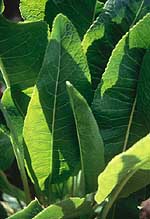| Home A B C D E F G H I J K L M N O P Q R S T U V W X Y Z |
|
Home |
Horseradish Sauce Health Benefits
The health benefits of horseradish sauce are numerous, sinus and cold cure to name a few. Horseradish sauce is made by shredding and pounding the fresh root to which is added lemon juice. In this form the horseradish juice can be stored in a cold place for at least a week. Horseradish plant, like garlic, is a plant that you cannot successfully put through a juicer. The reason is that the essential oils are extremely strong, so strong that the toughest physique will find them hard to tolerate. The horseradish herb is very beneficial for dissolving mucus in the nose and also helpful in sinus. Take a half teaspoonful of the sauce without dilution both morning and afternoon. Do not drink anything or eat for at least ten minutes after the dose. There will be a powerful feeling in the head, sometimes with sweating and usually accompanied by many tears (not of pain). Sinus troubles cause much pain and misery. The horseradish attacks the very cause of the condition and brings relief. Sometimes it is necessary to continue the treatment for several months, but you will know when the horseradish has done its work because the violent sensations resulting from the use of the sauce will gently reduce and finally almost disappear along with the mucus. It is a good idea to combine this treatment with the juices of radish, including both leaves and root and carrot. These two will help to rebuild the tissues ravaged by the sinus infection. You will understand that it is also vital to make sure that your eating pattern becomes well-balanced with the avoidance of refined carbohydrates and the adoption of a basically natural diet. Horseradish is also specific for relieving water retention, or dropsy, as it used to be called. This is tied in with a stimulating effect on the blood capillaries caused by the action of the main therapeutic principle in the plant, a glycoside called sinigrin. Horseradish has exceptionally high vitamin C content, with 114mg per 100g (4oz) ? this is one of the highest vegetable concentrations. It has as well some of the highest amounts of potassium and sulfur, and a good quantity of calcium. Other uses that have been identified are for diabetics, where Professor Kuhn found an improvement in the blood picture, for coughs and catarrh and in the treatment of circulatory problems of a mild nature. About The Author: |
||
|
|
||
|
Glossary References Links Contact
|